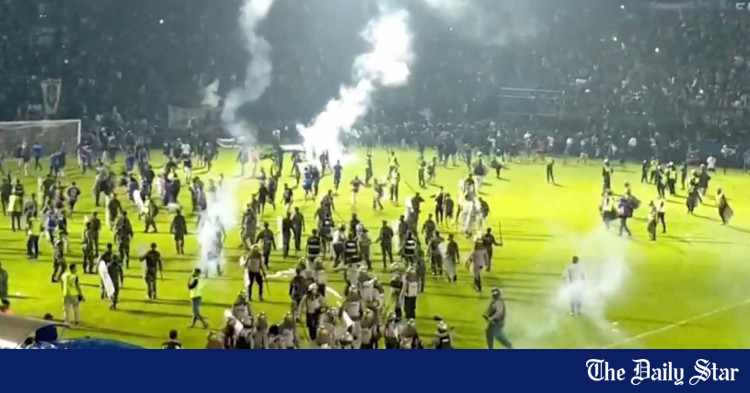Stampede during a football match in Indonesia: 174 dead
At least 174 people have been killed and 180 injured in a stampede and riot at a soccer match in Indonesia, officials said on Sunday, in one of the world’s worst stadium disasters.
When frustrated fans of the losing home team stormed the Malang ground in East Java province late on Saturday, police fired tear gas in an attempt to control the situation, sparking the stampede and choking cases, a said East Java Police Chief Nico Afinta. journalists.
“It had become lawless. They started attacking officers, they damaged cars,” Nico said, adding that the crash happened when fans ran for an exit door.
Video footage from local news channels showed fans streaming onto the pitch after Arema FC’s 3-2 loss to Persebaya Surabaya around 10 p.m. (1500 GMT). Scuffles can be seen, with what appeared to be tear gas in the air.
BREAKING: More than 100 people were killed and 200 injured in a riot at a football stadium in Malang, Indonesia, authorities said. #new #Recent news #Newsnight #News Update #NewsBreak #soccer #Indonesia #malang#AremavsPersebaya#arema #Kanjuruhan #bonekjancok #Soccer pic.twitter.com/SXhCPfTId9
— This Guy Shane (@ProfanityNewz) October 1, 2022
Footage showed people who appeared to have passed out being carried away by other fans.
The head of one of the area hospitals treating patients told Metro TV that some of the victims suffered brain damage and the deaths included a five-year-old child.
Indonesian President Joko Widodo said authorities must thoroughly assess security at matches, adding he hoped it would be “the last football tragedy in the country”.
Jokowi, as the president is known, has ordered the Indonesian Football Federation to suspend all games in Indonesia’s top league BRI Liga 1 until an investigation is completed.
RULES ON TEAR GAS, OVERCAPACITY
World football’s governing body, FIFA, specifies in its safety rules that no firearms or “crowd control gas” should be carried or used by stewards or police.
East Java police did not immediately respond to a request for comment on whether they were aware of these regulations.
FIFA requested a report on the incident from the Indonesian football association PSSI, and a PSSI team was sent to Malang to investigate, PSSI general secretary Yunus Nusi told reporters.
Indonesia’s human rights commission also plans to investigate security on the ground, including the use of tear gas, its commissioner told Reuters.
“Many of our friends lost their lives because of the officers who dehumanized us,” said Muhammad Rian Dwicahyono, 22, in tears as he treated a broken arm at the local Kanjuruhan hospital. “A lot of lives have been ruined.”
On Sunday, mourners gathered outside the stadium gates to lay flowers for the victims.
Amnesty International Indonesia blasted the security measures, saying “the use of excessive force by the state…to contain or control such crowds can absolutely not be justified.”
The country’s chief security minister, Mahfud MD, said in an Instagram post that the stadium had been filled beyond capacity. He said 42,000 tickets had been issued for a stadium which is only supposed to hold 38,000 people.
Many victims at Kanjuruhan Hospital suffered trauma, shortness of breath and lack of oxygen due to the large number of people at the scene hit by tear gas, paramedic Boby Prabowo said.
THE WORST FOR HALF A CENTURY
Financial assistance will be given to the injured and the families of the victims, East Java Governor Khofifah Indar Parawansa told reporters.
There have already been outbreaks of unrest at matches in Indonesia, with strong club rivalries sometimes leading to violence between fans.
Indonesia’s football scene has been blighted by hooliganism, brutal policing and mismanagement, largely preventing the country of 275 million stadium-filling people from realizing its potential in the sport.
Zainudin Amali, Indonesia’s sports minister, told KompasTV that the ministry will reassess security at football matches, including considering not allowing spectators in stadiums.
The Malang stadium disaster appears to be the deadliest since 1964, when 328 people were killed in a riot and crush when Peru hosted Argentina at the Estadio Nacional.
In an infamous UK disaster in 1989, 96 Liverpool fans were crushed to death when an overcrowded, fenced-off enclosure collapsed at Hillsborough Stadium in Sheffield.
Indonesia is set to host the FIFA Under-20 World Cup in May and June next year. They are also one of three countries bidding to host next year’s Asian Cup, the continental equivalent of the Euros, after China pulled out as hosts.
Asian Football Confederation chief Shaikh Salman bin Ebrahim Al Khalifa said in a statement that he was “deeply shocked and saddened to hear such tragic news from football-loving Indonesia”, expressing his condolences to the victims, their families and friends.


Comments are closed.